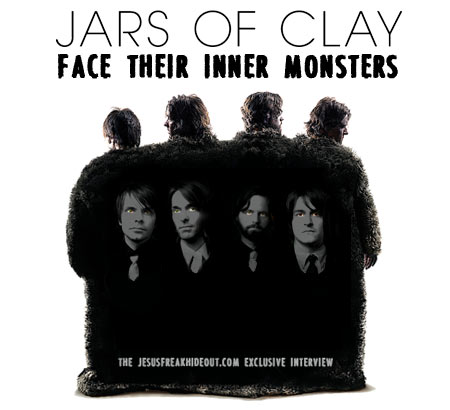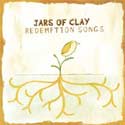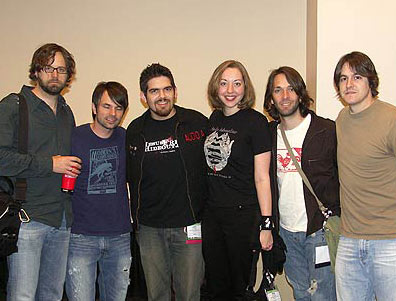
Matt Odmark: We saw it all coming. *laughter*
Dan Haseltine: Pretty much. It's been all calculated. No - yeah, it was definitely a surprise. I mean, most of the bands that were making music when we were, in the nineties, aren't around anymore. (Matt: Even in the mainstream, and the Christian ones.) Yeah. I think we've been surprised that we've been able to still have an audience after so many years, still have fun making music together. And even just in the dynamic of a band, there's volatile relationships. And just for us, staying together as a band and enjoying each other even more now than ever is a huge surprise, too. Musically, I think it's also been a surprise. This record that we're finishing up making, I think for us, has been an album that's full of all kinds of new energy. Sometimes we think we don't have it in us and then it comes out again.
Steve Mason: Our best record. (John: Really?) Best record!
Steve: Yeah! Yeah! And we say this [that it's our best record], because people we know and trust that we've spoken to after hearing it have said that, so now we feel okay saying that. Cause you always feel like, "Oh, well my most recent child is my favorite." But we're really starting to own that because it's been fun. We recorded a lot of it live. We spent a couple weeks arranging the songs and kind of rehearsing them. So when we went in the studio then, it was really just getting the sounds out. And then we click off and all play. It was just a really fun way to do things. And I think the most satisfying part is it exercised the thirteen years of equity - emotionally and otherwise - that we've kind of nurtured to where we trust each other and realize we're advocates -- on our best days. And we're not as easily threatened by slopping things up and so the creative process takes on this power. It makes for a great record and I think what Dan's writing about and where we all are kinda relationally and thematically throughout the record is just the most satisfying process yet.
Matt: I think it's definitely the most adventurous project of ours in awhile -- musically, and I would say lyrically as well. I mean, musically, it feels much more rock and roll than anything we've done in a long time and much more sort of like a new band going for it. Playing the songs hard and as loud and as believable as they can. And I think, if I can speak a little bit for Dan, and then he'll probably want to either correct me or fill in the hole, *laughter* but I think what has impressed me about Dan's contribution lyrically to this record is that he seems the most comfortable in communicating the process of who he is on this record rather than sort of trying to make conclusions about who we are or ought to be or whatever. The record's a lot more brutally honest with the sort of the partial nature of who we are and doesn't feel the need to fire guesses at what we ought to be as much, as just communicate honestly what it feels like to be in this moment, wrestling with these things. In that sense, it feels much more an album about his story or our story. This has less to do with a sentiment or an idea we're throwing out there as much as this is who we are.
Dan: The themes really do center around brokenness, addiction, isolation. It's a lot more focused on the humanity side. I think Matt said it well. We have songs that might point a little more of a critical finger at certain parts of the Christian world. Some songs are a little more political. But it really is under the guise of presenting people with issues not void of hope, but comfortable enough to be able to just wrestle with the tension of them.
Matt: There's quite a lot of relationship in the songs too. We kind of forget about that. We talk a lot about the songs that are exploring justice issues and stuff like that. But there are several songs that are just about the raw nature of relationships.
Steve: Yeah. And I think that the neat thing about that is we're learning. I think we're all in this journey. We're learning that the way we understand our relationship to God, y'know the divine nature, that is manifested through relationships with people. This stuff is fleshed out communally. It's through living in a community with other people, versus the isolation. That's one of the strongest and most resonant parts for me because I think that's personally where I feel like I'm on the journey.
Dan: I think that something that I've found in the last year is this language of recovery. It's a lot of the language that people use in twelve-step groups, whether it's alcoholics anonymous or sex addicts anonymous, or any of these kinds of groups where you just find that they're speaking of their humanity and coming to the conclusion that they're helpless over it. And I think for me, that language of recovery is really important for all Christians because it's really the language that we live in. It actually puts words to the process that we're in. We're recovering from so many different things, whether it's bad theology or just the way that the fallen world has kind of put us together. So I think that language is appropriate whether or not somebody has a severe addiction or whatever, it's still a great way to put in context this story of redemption God has placed us in.

Steve: Yeah. I mean, Matt said it before. The hymn record was really an aside. It was kind of a way of leaning into the conversation of church music and saying, "Well this isn't necessarily our story, this is kind of more where we resonate as four guys who go to church on Sunday. These are the things that mean something to us." We have a dear friend who's been a part of the Reformed University Fellowship and rewriting hymns, and some other writers who have rewritten melodies, that's just what moved our hearts because we all grew up in the church and are familiar with that stuff and we liked the idea that new melodies enhanced the lyric. So it was kind of an aside.
Matt: I can't help but feel like to a degree like the text that we sort of immersed ourselves in and the hymn record have had some effect on how we're speaking on this record. I mean, I don't want to say that we're writing in a paradigm of hymns now or something, but there was something we were really drawn to - the way that hymns sort of unpack the Gospel story as it really plays out for real people that have to show up in real churches with real problems every Sunday, y'know what I mean? I think for us that's a reason why these hymns have meant so much to us - why they felt different than maybe a lot of other music that was being offered up for our church environments and why they felt important to still be in the mix of churches - why it felt like we lost something when we didn't have this kind of language, a sort of preaching at us through our engagements in worship. I think if you look at a lot of the hymns, even the ones we chose, there's really sort of hints at kind of this idea of recovery language in those words. There's very honest statements about how - I can't find a phrase that doesn't seem cliched -- but sort of how undone and broken as people we are and how committed to our own destruction we can be, and what a stark contrast grace and the Gospel is to the way we live. I think you find a lot of that language in hymns in a way that just humbles you and really moves you to a place where you can kind of be in awe of what God has done again. And I think in that sense, the way hymns make you feel is a little bit the way the lyrics on this record also make you feel. It's at least what I'd say what we were kind of going for.
Steve: We like to say that it reorients the heart to the Gospel.
Charlie Lowell: You have to sort of take yourself to the dark, low places before you can understand them.
Matt: It's not underestimating how loud the other voices are. I mean, let's be honest, our culture is so heavily messaged, whether it's through media, our peer groups, whatever. And for most of us, the Gospel and the Christian message is such a whisper with regards to how sophisticated and how loud every other voice is. Our worship has to take that into account at some point, otherwise it's just going to get lost in the mix. And it has to really do battle with that kind of messaging. We have to begin to see ourselves as people who can be deprogrammed, otherwise our experiences in worship are just going to be anemic little asides in our day-to-day life. So I think that's part of the reasons we found hymns so helpful to us.
Steve: And then now we just wanted to rock! *laughter*
Dan: They got tired of playing acoustic guitar on the stage.
Matt: We had two records of soft music, let's rock it!
Steve: And it's fun. We did a couple little club things here in town. It was really fun. Very loud.
Charlie: We got a little carried away. *laughter*
Steve: Y'know, it's really funny because we don't really have any direct. I mean the stuff we're listening to right now does not pertain at all. *laughs*
Matt: We're listening in very divergent directions. Like usually, on past records, there's been a couple common influences that sort of speak into the processes, like a record that we kind of look for and go, "there's something that's happening in this record that we all kind of think is cool and we'd like to find a way to [capture that]" *the guys start mentioning projects and artists all at once, agreeing with each other* ...or even that Solomon Burke record for Who We Are Instead. But I don't know that there's really been a lot of agreement. *laughters*
Charlie: There's a lot of 80's references. (*all agree*) That's a first.
Steve: We're experiencing freedom there too.
Charlie: It's less defined. The album's kind of all over... (*all agree*)
Steve: The links are more lyrical and thematic than musical. There's an interesting sort of "Jackson" song we do with Leigh Nash where Dan and Leigh sing together.
Matt: That would probably most embody what I've been listening to for the last year. (*all agree*) I've been in that phase, but the band - Dan's been listening to...
Dan: The Ramones and the Cars, really. Kind of having an 80's renaissance in my car. *laughter*
Steve: Yeah! And then like Talking Heads, Roxy Music, Joe Jackson, Duran Duran...
Charlie: And then newer stuff that's kind of 80's throwback, like Arcade Fire...
Dan: January, really.
Dan: We're mixing. It's almost finished.
Dan: September eighteenth I believe it is. **NOTE: Release date is officially September 5th!**
Dan: Good Monsters. (John: Good Monsters??) Yeah. (John: *laughs* That's awesome.)
Charlie: It's got some surprises.
Steve: Yeah, we have monster suits, actually. *laughter*
Dan: Well, it really is the process of looking in, and becoming comfortable with what and who we are. Talking about the way the church has really suffered because we fail to engage in a conversation about our present pain, present suffering, present addiction, present frustration. It's always things that are, "Well, I used to do this" or "This is part of who I used to be but now I'm a Christian," and always talking about our victory when the reality is no, not really. We still exist in our humanity and being comfortable with that. Recognizing who we are - that we're both good and we are also monsters, and being honest about that in an honest conversation with good relationships, good community - you have to have that. It's that, and then there's a song on the record called "Good Monsters" and it's based off of an Edmund Burke quote where he says, "All that is necessary for the triumph of evil is that good men do nothing." And it's basically recognizing that when we're able to really be comfortable with who we are, what we are, that's when we can humbly enter into the suffering in the relationship with somebody else without kind of having this sense of being better than they are... (Matt: Or needing them to tell us who we are.) Yeah, and that. And for us, that's played out in this in the areas of social justice. With bloodwater Mission, how do you walk into a community and not walk in as if you're the great hope. But you're just a guy going in to learn and serve and be served as much, y'know? And how is that an equal playing field - not simply going there to help, we're going there to engage in a relationship that offers someone who's even suffering dignity and respect.
Dan: We did it all ourselves.
Steve: We just got word a couple days ago Sarah McLachlan passed on singing on the record, which was a drag. But we talked to her! Well, Leigh Nash guests on it.
Dan: We got the African Children's Choir on a song. Youssou N'Dour is going to sing on a song this summer, but it probably won't end up on the record with him on it.
Steve: We're still waiting to hear on... *long pause, before discreetly mumbling* Bono, maybe... Yeah, we're trying to dream big. (Dan: Why not?) Throw it out there, if they don't like it... Um, that's kinda it for guests?
Matt: The question was, "Who'd you work with on this record?" (John: Yeah, I wasn't sure if there was a producer or...)
Steve: Mitch Dane. Mitch has engineered past records with us.
Matt: This record has been a communal effort as well. I mean, we've worked with people who we've been building relationships with, whether from an engineering front, musicians, or everything. We did have to incorporate a new drummer on this record which was a huge blessing but I mean, the people we have worked with before weren't going to work out, so we were kind of forced to consider new options for the first time. (Amy: Will that drummer perform with you live?)
Charlie: Yeah! It's the first time that's happened.
Matt: He was on tour with us first and we realized, "That guy's good." *laughter* Or more like, "We should have him play in the studio!" So that turned out great. It was cool. He brought a lot to the studio process. So yeah, it's neat.
Steve: I wish we could just play something. Cause, y'know, we talk about it all day and we have to wait around for five months.
Dan: Our head's are going to explode.
Dan: Yeah, and I think we're going to tour a little differently too in the terms of the way we present our show. I think for a long time we've really leaned against a lot of our old songs to kind of try to build a show that's captivating... (Steve: I was just gonna say there's a stereo upstairs...) Oh yeah, and we're thinking about doing this record front-to-back live and maybe doing a couple other songs, and really making the tour about this album, which is something we haven't done since the first record when we only had one record to play. *laughter* (Matt: And we played a couple songs twice. We're good!) Which we're excited about. I think we feel like a different band now - the things we're talking about, the way we want to present ourselves. It's a new season. (Amy: I can't wait to see it live!)
Matt: Yeah, we're beginning to get into rehearsals. That thing's gonna be good.
*At this point, Steve whisked John, Amy, and the rest of Jars to the top of the Gaylord
Entertainment Center to play "Work" from Good Monsters over a stereo system in a banquet
room.* Good Monsters releases September 5, 2006.

 Jamie MacDonald Celebrates Dominating Debut Jamie MacDonald Celebrates Dominating DebutTue, 17 Feb 2026 16:17:00 EST |
 PJ Morton's Morton Records Inks New Deal with SRG-ILS Group PJ Morton's Morton Records Inks New Deal with SRG-ILS GroupTue, 17 Feb 2026 16:12:00 EST |
 Freedom Heart Releases "Love Me Differently" To Christian Radio Freedom Heart Releases "Love Me Differently" To Christian RadioTue, 17 Feb 2026 16:06:00 EST |
 Robert Peterson and the Crusade Drops "Sometime" Robert Peterson and the Crusade Drops "Sometime"Tue, 17 Feb 2026 16:00:00 EST |
 Petra Releases "Filthy Lucre" to Christian Radio Petra Releases "Filthy Lucre" to Christian RadioTue, 17 Feb 2026 15:35:00 EST |
 Collective Dust Streams New Single "2007 Called, They Want Their Music Back" Collective Dust Streams New Single "2007 Called, They Want Their Music Back"Tue, 17 Feb 2026 15:20:00 EST |
 Stryper Frontman Michael Sweet Releases New Single "Lord" from Upcoming Solo Album Stryper Frontman Michael Sweet Releases New Single "Lord" from Upcoming Solo AlbumMon, 16 Feb 2026 17:03:00 EST |
 Click here All News Headlines |
Click here All News Headlines |